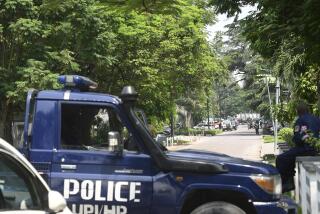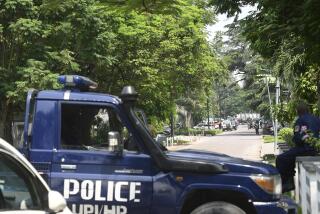Abuse of 34 Held in Zambian Putsch Alleged
- Share via
LUSAKA, Zambia — Prison officials refused Saturday to let investigators visit those arrested in a failed coup attempt, ignoring condemnation from human rights groups and a ruling from Zambia’s courts.
A state-appointed human rights commission was barred from Lusaka Central Prison, where 33 soldiers and opposition politician Dean Mungomba have been held since the Oct. 28 revolt.
Judge Lombe Chibesakunda, the commission’s leader, said the group was trying to investigate allegations that the prisoners had been tortured and denied food and water.
Lavu Mulimba, a spokesman for the commission, said the group was denied entry both Friday and Saturday.
Amnesty International, the London-based human rights group, said the prisoners have been assaulted, subjected to electric shocks and burned with cigarettes.
Mungomba, head of the small Zambia Democratic Congress party, was allegedly tied to an iron bar and tortured. His wife, Rose, said Saturday that doctors were preparing reports on his wounds, bruises and burns.
“The attempted coup cannot be used as an excuse to inflict this cruel, inhuman and degrading punishment,” Amnesty said.
Mungomba is the only opposition leader known to have been arrested since mutinous soldiers captured the state broadcast center and claimed to have toppled President Frederick Chiluba. They were later overpowered.
The high court in Lusaka ordered the government Thursday to allow Mungomba, a former deputy finance minister, to receive family visits, food, medical attention and legal advice.
Mungomba’s party is one of seven groups in an opposition alliance led by former President Kenneth D. Kaunda.
The alliance has accused the government of using the state of emergency, which was declared after the failed coup, to crack down on its political opponents.
The state of emergency gives Chiluba’s government sweeping powers of arrest and detention without trial.
Kaunda led the nation to independence in 1964 and ruled for 27 years until he was ousted by Chiluba in the first multi-party elections in 1991.
More to Read
Sign up for Essential California
The most important California stories and recommendations in your inbox every morning.
You may occasionally receive promotional content from the Los Angeles Times.










